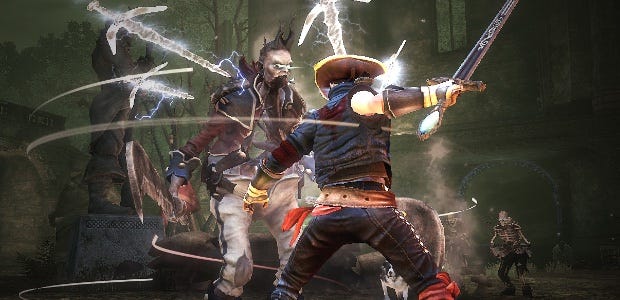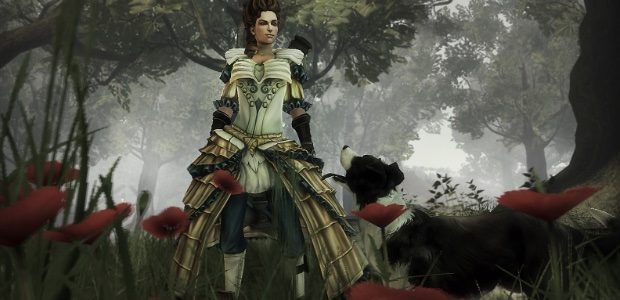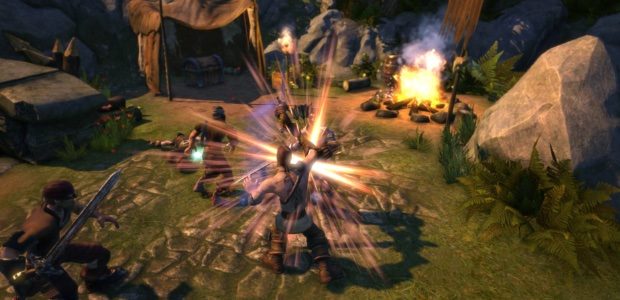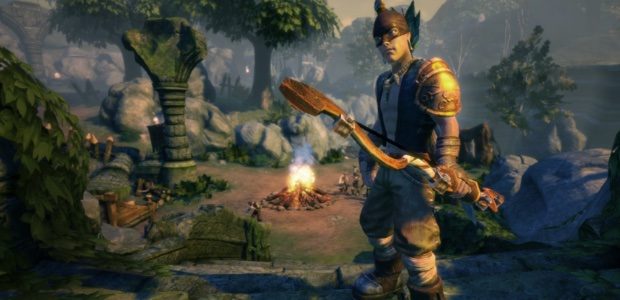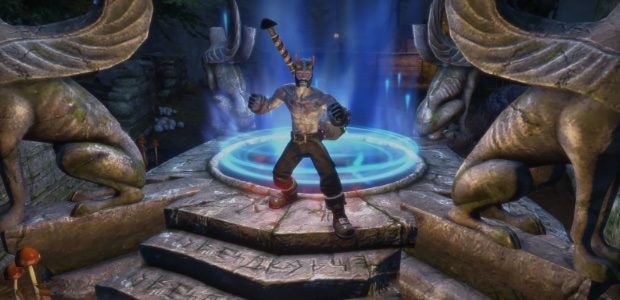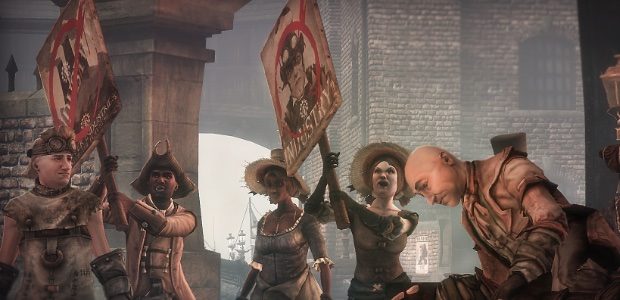The lessons Of Fable and what we want from a sequel
Back to Albion
According to the rumour-mills, we may be due another Fable in the world of Albion. A Fable 4, if you will. It's easy to shrug that off as no big deal. Fable is arguably the series most talked about for what it doesn't do rather than what it pulls off, not helped by the PT Barnum level overpromises of a certain Mr P. Molyneux. Plant an acorn and watch it grow into a tree, anyone? Not in this game...
When you ignore all of that though, and look at Fable as the hack-and-slash RPG that it is rather than the fantasy life simulator it was pitched as, it's always been a somewhat underrated series with great ideas practically oozing from its pores. Successful? Often not, but if a sequel promises anything, it's another crack at what could have been great. What does Fable 4 have to draw on? Plenty...
For starters, Fable isn't a series that just rests on its laurels. Each follows the same basic concept, with a largely linear path through the adventure, but with plenty of side-activities and quests to help shape your character and earn cash. The central gimmick is that how you play affects your character. Do evil, and you'll grow horns. Use lots of magic and power will crackle from your fingertips. Likewise, how you choose to play affects your reputation and available titles, from "Chosen One" to "Nobhead", with the NPCs reacting accordingly, and the availability of some of the missions and rewards. Demon Doors, for instance, won't open and reveal their treasures for a goody two-shoes. Getting married and buying property raises your status, while having unprotected sex can result in having a child. Over the course of the game, these decisions mean that while everyone's playing the same story, everyone's character ends up unique. Said focus is also why during development at Big Blue Box (a company that would later merge with Molyneux's Lionhead Studios) Fable went by the codename 'Project Ego'.
This was more or less enough to carry the first Fable game, though it was a confused beast at the best of times and disappointing for how simple it was after all the promises and hints of something far grander. The story in particular was completely at odds with most of the actual action, jerking awkwardly from a game about hacking wacky critters and farting at comedy NPCs to plot beats about your lost sister being kidnapped and having her eyes gouged out by a bunch of bandits.
Not too surprisingly for a game that had been in development for years in the proximity of Molyneux's ambitions, it felt like both a cut-down version of what it was meant to be, and not entirely sure what that was. Still, it was fun, offered a lot of freedom for an RPG not called 'The Elder Scrolls', and had great ideas, like being able to 'Boast' at the start of quests - taking on more risk for extra reward - and like heading out to fight evil in nothing but your Union Jack pants.
Fable 2 (sadly, not available on PC) benefited from having a successful template to work with, and being able to build on it - to make the world more dynamic, to get rid of annoyances like the first game's constant narrator nagging (despite that narration being from Knightmare's Tregard, it got old fast). It also changed the world drastically, jumping forwards in time with an intro straight out of Dickens, and in a rarity for RPGs at the time, targeted newcomers to the genre more than old hands with the addition of a controversial breadcrumb trail that would lead you directly to your next objective so you didn't have to rely on a map. It worked because there was enough around the edges to ensure that deviating from the path was usually worthwhile, but RPG veterans did reasonably chafe at feeling dragged around by the collar.
With all the changes, it's arguably the most successful of the games, with the least interesting main story, but the most interesting and complete feeling path through it - helped by the introduction of characters like Stephen Fry's lovably evil Reaver and the true star of the game, the player's dog. This was an attempt to add more of an emotional connection to the action, even if the result was spending most of the game waiting for your hound to be killed in a suitably dramatic fashion, a la Dogmeat from Fallout. This indeed happened, with the final decision of the game ultimately boiling down to whether you wanted to bring your dog back, to sacrifice your family for the good of the rest of the world, or a veritable shitload of money. At least until a DLC expansion made it possible to resurrect the mutt separately, to a mix of grumbling and reluctant coughing up.
As easy as it is to be snarky, the dog did work. Looking back, it might be hard to see the resonance, but this was only a couple of years after Nintendogs proved that people could develop a relationship with a fake canine buddy, and even if you didn't form a connection, the dog served a valuable purpose by digging up treasure and helping against enemies. It didn't quite provide the emotional core that Molyneux hoped for, but it was a memorable addition that defined the kind of feature that the series wanted to offer for both veterans and the mainstream audience flocking to console RPGs.
Unfortunately, what followed was Fable 3 (no longer apparently available on PC...), later described by Molyneux himself as "a trainwreck". It's not a Descent To Undermountain or Ultima IX level calamity, being at least playable from start to finish and still having plenty of fun moments, but it's still a game largely defined by its failure. The concept, tragically, was fantastic - to spin the RPG on its head for a look at what it means to rule rather than simply fight for justice, and explore the issues that the average hero doesn't normally have to worry about. The premise is that you're the sibling of a cruel king, Logan, and that you flee and join the resistance with the goal of taking your bro down. You do this by travelling the country, making friends with its different factions, and promising that you'll fix their problems, only to find that things are more complicated and that your good intentions may have to be sacrificed for the greater good of the country.
But just like in the game, good intentions in the design aren't enough. In practice, it fails early on by not actually giving you any say in those promises, removing the intended emotional conflict entirely. Then, after seizing power, the threat turns out to be laughable. It's revealed that Logan was bleeding the country to prepare for an upcoming invasion of a monster called the Crawler, and as ruler, you're expected to make the same decisions. Build an orphanage or a brothel? That kind of thing. The catch is that this is Fable, which meant that by this point of the game most even vaguely comprehensive players had or could put together enough money to defend the country with their pocket change, rendering all of this completely moot. Also, the ultimate darkness is a complete pushover that can be taken out in a one on one fight. Bah.
Still, as with the rest of the series, the issue here is execution rather than concept - and a few years away from the series, rather than a rush to get another game out before a console generation change or another similar game eating its lunch, is actually a pretty positive starting point. Even during this wasteland, the series has had interesting moments for those willing to take a look, with Fable: The Journey being widely eye-rolled at for being an on-rails game (despite Molyneux's protestations, it was most definitely an on-rails game) but still doing some fun narrative stuff, and the launch of CCG Fable Fortune, which I confess I haven't played myself, but which looks pretty enough and currently has a Very Positive rating over on Steam.
With the same push for great ideas, and the incredible things done in both RPG and other genres since Fable first appeared back in 2004, there's ever possibility that a new game could pick up on what worked - the customisation, the humour, the charm of its tongue-in-cheek British world, and the commitment to trying new ideas - while learning from the games and emotional experiences that came later.
Fable is never going to be a hardcore RPG franchise, and that's fine. There's nothing wrong with hack and slash. But there's a definite space in the market for a hack and slash with more depth and breadth than your average dungeon or monster infested field, and it's shaped exactly like a plucky hero with a big sword, big ambition, and bowels full of poo-gas ready for anyone who might deserve it. Fingers crossed that if the rumours are true and Fable 4 is indeed on its way, it's the game that takes everything the series stands for, and finally makes it a game praised for what it does well rather than standing primarily as a testament to what it could have been.
